Trigger Warning: This article contains descriptions of violence, including rape, physical assault resulting in broken limbs, drowning, and the aftermath of a fatal attack on a transgender woman. It also mentions the circulation of distressing video footage of the victim in her final moments. Please exercise caution if you are sensitive to such content.
Bello, Antioquia, Colombia – The horrific murder of 32-year-old Millerey González in Bello, Antioquia, has ignited widespread outrage across Colombia, intensifying calls for justice and greater protections for transgender individuals. Millerey, known affectionately as “La Millerey,” was found deceased on April 5th after a brutal attack during the first weekend of April.
According to reports, Millerey was raped, her arms and legs were broken, and she was subsequently thrown into the La García stream. Despite being rescued from the water by firefighters and police and transported to a nearby hospital, she succumbed to her injuries. Adding to the cruelty of the incident, videos filmed by onlookers capturing Millerey’s struggle in the water circulated on social media, sparking further indignation and accusations of societal indifference.
Millerey’s tragic death marks the 25th reported killing of a queer individual in Colombia this year alone, underscoring the alarming prevalence of violence against the LGBTQ+ community, particularly transgender people. This grim statistic has galvanized activists and community members, leading to significant demonstrations in major cities across Colombia, including Bogotá, Medellín, Cali, Barranquilla, and Bello.
At vigils held in Millerey’s honor, participants lit candles, displayed her photographs, and waved the transgender pride flag, expressing their solidarity and demanding an end to transphobic violence. Elizabeth Castillo, a prominent politician and activist, addressed reporters at one such gathering, stating, “That’s why we are here, firmly rejecting this structural violence from all fronts.”
President Gustavo Petro also condemned the killing, labeling it as “fascism” on his X account and asserting that such violence stems from the “violent elimination of human differences.” Lorena González Ospina, the mayor of Bello, echoed this sentiment, vowing to seek justice for Millerey. “Sara was brutally attacked, her arms and legs were broken, and her body was thrown into the river. And it is deeply painful to think this happened amid the indifference of so many. We cannot allow transphobia to keep taking lives in silence,” Mayor González Ospina stated. She emphasized the local government’s responsibility to the LGBTIQ+ community and pledged to work towards a city where all lives are treated with dignity and respect.
In a bid to bring the perpetrators to justice, a reward of 50 million Colombian pesos (approximately $11,000 USD) has been offered for information leading to their capture.
The Ministry of Equality, established to combat discrimination, also strongly condemned the murder and urged the Interior Minister to convene an emergency meeting with local authorities in Bello to optimize the response to such incidents. The Ministry further called on the police and the Prosecutor General’s Office to conduct a thorough investigation, holding those responsible accountable and implementing preventative and protective measures for the local LGBT+ community. They stressed that this case should not be viewed in isolation but rather as a manifestation of the deep-seated structural inequalities that contribute to violence against transgender individuals.
The Ombudsman’s Office reported that they have received reports of 13 transgender individuals being assassinated so far this year, highlighting the urgent need for systemic change and effective protections.
The Bottom Line
Millerey González’s story, marked by a life of exclusion and hardship, including childhood sexual abuse and years spent living on the streets, tragically underscores the vulnerability of transgender individuals in Colombia. Her visible identity, as advocates point out, ultimately cost her her life. As her image becomes a symbol of resistance, her death serves as a stark reminder of the dangerous reality faced by transgender people in the country. Organizations like OrgulloLGBT.co have vehemently condemned the “atrocious assassination” and are demanding swift and thorough investigations, emphasizing that the dignity of life should not be contingent on gender identity.
The collective outcry following Millerey’s murder reflects a growing demand for accountability and a fundamental shift towards a society that values and protects all its citizens, regardless of their gender identity.


